Fall 2023
Understanding Alchemy through Laboratory and Literary Practices
October 19
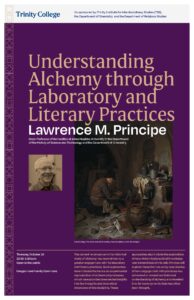
Making Beauty, Making Sense, Making Waves: A Public Talk about Creativity, Community and Collaboration.
October 12
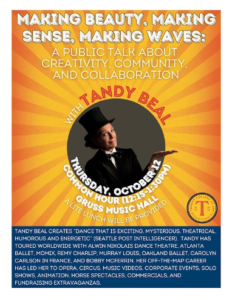
JOY!
October 13-14
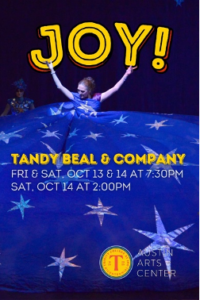
Fall 2022
10-day residency of Anton Ovchinnokov:
A performance titled “Beauty of the Beast” on Friday, October 14 at 7:30 PM
A creativity jam on Monday, October 17 at 1:15 PM
A performance titled “Duel.Solo” on Tuesday, October 18 at 4:30 PM.
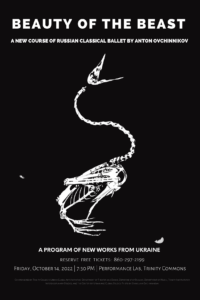
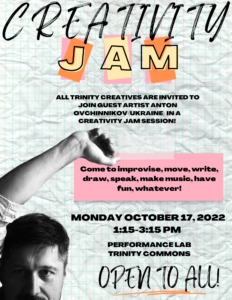
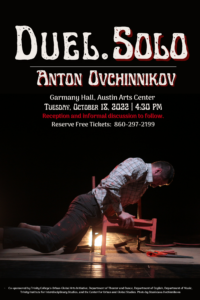
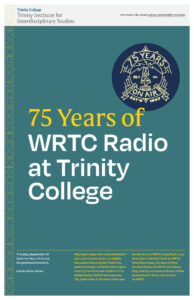
Thursday, September 22nd
1:10pm CommonWhy does independent radio still matter? Join us for a community roundtable discussion featuring Ken Freedman, general manager at WFMU, the longest-running free-form radio station in the United States; Raffi Khatchadourian ‘95, staff writer at The New Yorker and former host on WRTC; Craig Black, longtime host of World O’ Funk on WRTC Taive Muenzberg ‘23, host of More Cowbell Please on WRTC; Joshua King, visiting assistant professor of Italian and host of Duck, You Sucker! on WRTC
Spring 2022
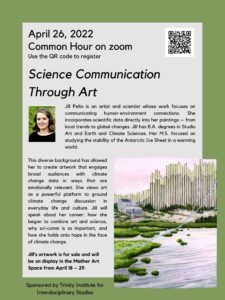 Tuesday, April 26 12:15, webinar
Tuesday, April 26 12:15, webinar
“Science Communication Through Art” – a webinar with Jill Pelto
Jill Pelto is an artist and scientist whose work focuses on communicating human-environment connections. She incorporates scientific data directly into her paintings — from local trends to global changes. Jill has B.A. degrees in Studio Art and Earth and Climate Sciences. Her M.S. focused on studying the stability of the Antarctic Ice Sheet in a warming world. This diverse background has allowed her to create artwork that engages broad audiences with climate change data in ways that are emotionally relevant. She views art as a powerful platform to ground climate change discussion in everyday life and culture. Jill will speak about her career: how she began to combine art and science, why sci-comm is so important, and how she holds onto hope in the face of climate change.
To view the Webinar, click here
Thursday, February 10th 6:00, Webinar 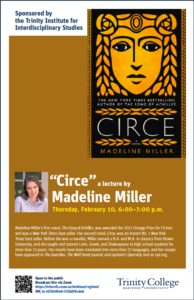
“Circe” – A lecture by Madeline Miller
Madeline Miller’s first novel, The Song of Achilles, was awarded the 2012 Orange Prize for Fiction and was a New York Times best seller. Her second novel, Circe, was an instant No. 1 New York Times best seller. Before she was a novelist, Miller earned a B.A. and M.A. in classics from Brown University, and she taught and tutored Latin, Greek, and Shakespeare to high school students for more than 15 years. Her novels have been translated into more than 25 languages, and her essays have appeared in The Guardian, The Wall Street Journal, and Lapham’s Quarterly and on npr.org.
To order a signed copy of Madeline Millers book “Circe”, please click here.
Fall 2021
Thursday, October 28, Zoom
Georg Popp: The Cypress Forest – A landscape photography experience
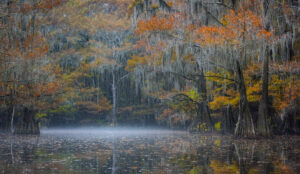 Landscape photography has come a long way from being instrumental in creating National Parks or protecting wild rivers from being destroyed by dam projects and the like, to becoming a negative influence for mass tourism or even a direct threat to fragile natural areas.
Landscape photography has come a long way from being instrumental in creating National Parks or protecting wild rivers from being destroyed by dam projects and the like, to becoming a negative influence for mass tourism or even a direct threat to fragile natural areas.
It might not always be that black or white but in times of social media, bloggers, vloggers, influencers and the huge and instant impact everything can have as soon as it is posted somewhere in the web, the innocence of taking landscape photos and sharing them is gone for sure.
As a professional landscape photographer, being in business for over 25 years, I have been taking photos in the cypress swamps in Louisiana and Texas for roughly 15 years now. I started exploring a mysterious paradise, that – very unusual in the USA – was almost forgotten by American photographers by then. To find the reason why it was so seldom visited by photographers is easy: Just try to get good shots there yourself and you’ll find out. Murky water, hassles with canoes, and photo spots that are not easy to find. Did I mention, you’ll run into some big alligators along the way too? Possibly in the dark, while trying to set up your camera for a sunrise shot…
In this presentation, I’ll tell my experience, from exploring the swamps for days and weeks without seeing any people, making award-winning images, trying to helping local people set up some eco-tourism business but also becoming part of the “dark side”, luring more and more photographers into this place, that would not survive there for two days themselves. But nowadays, you can be taken by photo tour-guides, who lead you right up to the best spots. It doesn’t have to be a bad thing but they will safely guide you in a wide circle around all dangers (and adventures at the same time!) maybe even by motorboat (and destroy the experience of lots of others, too!) and all you will ever have to do, is to press the shutter release. But landscape photography is more than that.
Series: Olmsted’s Brain: Discovering Health in Urban Places and Wild Spaces
All meetings will occur on Thursdays from 2p.m.-3p.m. via zoom
https://trincoll.zoom.us/my/health4brains
An awareness of the health benefits of nature is experiencing a major global revival. While health is just one “ecosystem service” of the natural world, brain health is arguably the most valuable. As we approach the 200th birthday of Frederick Law Olmsted, founder of landscape architecture, this course will consider new science and diverse perspectives on the role that urban places and wild spaces play in our physical and mental wellbeing. Presentations will range among history, emerging science and public policy in the context of current Olmsted’s appreciation for the immersive and restorative properties of nature.
Thursday, October 16
Mary Mahoney, Digital Scholarship Coordinator
Histories of “The Nature Cure”: The Therapeutic Power of Gardens, Camping, and Parks
In 1879, Friends Hospital established its first greenhouse for therapeutic use in treating mental illness. The greenhouse built on a decades-long commitment by the Hospital to create a beautiful landscape for its patients based in part on a prevailing belief that environment impacted health. “Garden therapy,” now called horticulture therapy, developed based on the idea that the act of gardening and the proximity to nature could have demonstrable effects on health. This same belief fueled the development of the “camp cure” in the late 19th century to offer white-collar workers a rest from work-related exhaustion. In the same period, Frederick Law Olmstead argued access to parks in urban spaces provided preventative health measures for urban dwellers at a time when concepts of disease were firmly linked to ideas of sanitation and hygiene. The resonance of this idea is evident in the public’s record-breaking use of national parks during the recent pandemic. This talk will sketch a history of attempts by medical professionals to make a therapeutic use of nature from 1800 to the present. In so doing, it will link past examples to present concepts of “ecotherapy” or “the nature cure” and identify key questions that persist in thinking about this topic, including: what have medical professionals used nature to treat? What do they believe it heals? How is it therapeutic? How does medicine center human beings in relationship to nature, and how does that reflect larger conversations about conservation and privilege? This talk will draw on archival research and an emerging subgenre of “eco-cure” memoirs to provide a shared language for discussion.
Thursday, September 30
Joan Maloof , Executive Director, Old-Growth Forest Network
Professor Emerita, Salisbury University
Shinrin-yoku: From Science to Literature to Culture
Where did the popular movement of ‘forest bathing’ begin? Our guest for this class, Dr. Joan Maloof, has some insights into that. Sixteen years ago she brought the Japanese research to a general US audience. The concept struck a chord. Now there are numerous books about forest bathing, and you can even get certified to teach it. In this introduction, Maloof will briefly describe the human health benefits from spending time in a forest, and discuss how science can change culture.
Thursday, October 28
Linda Powers Tomasso
PhD Candidate, Department of Environmental Health
Harvard T.H. Chan School of Public Health | Harvard University
It’s all interconnected: nature contact today, planetary health tomorrow
It’s hard to care about things we don’t know, and that includes nature. By extension, it includes the environment, climate, and our stressed planet. In this session, we will consider how contact with nature influences what is known as environmental attitudes and behaviors and more fundamentally, how we as individuals become changed through our relationship to nature. Examination of scientific evidence will launch our discussion. Plus, how you can participate in scientific research to move forward understanding of how time in nature affects brain health!
Thursday, November 18
Dennis Liu,Vice President of Education E.O. Wilson Biodiversity Foundation
Leave No Species Behind: Saving Nature and Ourselves
E.O. Wilson is strongly associated with the term Biophilia, the notion that we – as a species that evolved on earth- have an innate interest in organisms and living processes. We are part of nature. We love nature. And yet, we are in the midst of an intense extinction crises across the many scales of biodiversity. Dr Liu will explore ways in which the scientific approach can complement and harmonize with the informal ways that diverse people interact with and respond to nature. A mantra of the Half-Earth Project is to leave no species behind. But “species” is a human statistical construct, an abstract population of living things. Can big data and digital tools like the Half-Earth Map (map.half-earthproject.org) help people to love and save “statistical” creatures as an expression of biophilia?
Thursday, December 2
Michael Kellett, Executive Director at RESTORE: The North Woods
Why We Need New National Parks
The National Park System is open to everyone and helps fight climate change, prevent the loss of wildlife species, and provide vital public green space. In 2021, after a year of pandemic restrictions, record numbers of people flocked to America’s national parks. Yet, we have barely increased parkland acreage since the 1990s, and our existing parks are underfunded and often crowded. America’s national parks are a haven for native wildlife, clean air and water, geological wonders, intact ecosystems, and historic sites. They are also engines of economic activity and sources of local and national pride. Given the value of national parks to individual and community well-being, as well as their importance to our national heritage, adding new national park units and expanding many other areas can help to fully protect the values for which they were established.
Spring 2021
Thursday April 15, 2021
1:10pm Common Hour Co-sponsored by the Center for Caribbean Studies and Environmental Science.(rescheduled from spring 2020)
Lisa Paravasini, “The Port of Santo Domingo: Tidal Debris, Metal Pollution, and the Perils of Poverty Where the Caribbean Meets the Ozama.”
Lisa Parvasini is Professor of Hispanic Studies on the Randolph Distinguished Professor Chair, Vassar College. Prof. Paravasini is the author of several books including Endangered Species: The Environment and Discourses of the Caribbean Nation.
To register, click here
Monday April 5, 2021
7pm, Wassong Annual Lecture (rescheduled from spring 2020)
Maurice Wade, “Lloyd Algernon Best: Decoloniality and the Epistemic Importance of Place.”
Maurice Wade is Professor of Philosophy at Trinity College. Prof. Wade is co-editor of The Moral Dimensions of Public Policy Choice, as well as the author of numerous articles on race, sports, and animal liberation.
To view the lecture, click here
Thursday March 4, 2021
1:10 pm, Common Hour,Co-sponsored by American Studies and Anthropology (rescheduled from spring 2020)
John Jackson, Jr., “What Scholarship Looks and Sounds Like: Toward an Auto-Ethnography of Multimodality.” John Jackson, Jr. is the Walter H. Annenberg Dean of the School for Communication, University of Pennsylvania, Richard Perry University Professor; Dean Jackson is the author of books including Harlemworld: Doing Race and Class in Contemporary Black America, Real Black: Adventures in Racial Sincerity and co-editor of Social Policy & Social Justice. In addition, he is a film director and producer.
To register, click here
Tuesday March 2, 2021
1:10pm Common Hour, Co-sponsored with Classical Studies
Hunter H. Gardner, “Politics and Pestilence in Early Imperial Rome”
Hunter H. Gardner is Professor of Classics and Comparative Literature at the University of South Carolina, where she teaches a wide range of courses on Greek, Latin, and the ancient Greco-Roman Mediterranean. She is the author of Gendering Time in Augustan Love Elegy, and Pestilence and the Body Politic, and co-editor of Odyssean Identities in Modern Cultures: The Journey Home and Ancient Epic in Film and Television.
To view the talk, click here
Tuesday February 23, 2021
5:00 pm, Co-sponsored with the Center for Caribbean Studies
Faculty Panel, “Climate Change: the Ultimate Multi-Disciplinary Problem”
To understand and meet the challenge of climate change, we need to bring to bear all the intellectual, moral, and aesthetic resources we can muster. A panel of Trinity professors from across the College’s divisions — Natural and Social Sciences, Humanities and Arts — give examples of how they are approaching the existential crisis of our time. With Panelists: Johannes Evelein, Professor of Language and Culture Studies, Renny Fulco, Associate Professor of Legal and Policy Studies, Christoph Geiss, Professor of Physics and Environmental Science & Peter Kyle, Assistant Professor of Theater and Dance.
To view the talk, click here
January 2021
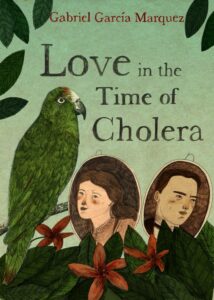 Wednesday, January 13, 2021
Wednesday, January 13, 2021
Co-sponsored by the Center for Caribbean Studies, English, Hispanic Studies and LACS
A Faculty Webinar Panel, “Love in the Time of Cholera”
As we ride the wave of the pandemic into another calendar year, please join our panelists for a discussion of Gabriel Garcia Marquez’s Love in the Time of Cholera, a novel chronicling a passion that spans decades and outlasts pandemics. Diana Aldrete (Hispanic Studies), Dario Euraque (History), and Sheila Fisher (English) speak about the novel from their own disciplinary perspectives as they link its themes to the concerns of our own historical moment.
Fall 2020
Thursday October 22, 2020
Co-sponsored by The Academy of Lifelong Learning (ALL)
Kevin McMahon & Rachel Moskowitz, “Pandemics, Polarization, and Presidential Politics”
This panel, with Rachel Moskowitz (Public Policy and Law) and Kevin McMahon (Political Science) will explore various aspects of this year’s presidential race, including questions such as: Will factors that have mattered most in the past apply to the race this year? How closely should we pay attention to public opinion polls? Will President’s Trump handling of the Covid-19 crisis ultimately determine the victor in this race? Will the Supreme Court issue and the pending Senate confirmation of Amy Coney Barrett change the conversation of the campaign? What strategies are the two candidates employing and how might they make a difference when all the votes are counted?
Wednesday October 28, 2020
Co-sponsored with Trinity’s department of Theater and Dance
“Screendance” a viewing and panel discussion facilitated by Rebecca Papas.
What is Screendance? How do you capture the spirit and motion of a living art form for the camera? In the age of Instagram and TikTok why make dance films? Join us for an illuminating discussion and screening with three visionary filmmakers and choreographers who will discuss their work and artistic processes in creating dance for the camera.
Thursday, November 12, 2020
Presented by Trinity Alumni Kari Sweeney Efferon ’03, Associate Director at Pfizer “The Vaccine Pipeline: Developing Safe and Efficacious Vaccines to Protect Against Some of our World’s Most Serious Threats”
The typical lifecycle of a vaccine from early research to commercial release is about 10 years. For the scientists, this is a very slow and methodical process with minimal risk to the company developing the product. When the need arises, how do companies accelerate that development, while hitting all the necessary milestones of safety and efficacy of a traditional 10 year development process? Walk through the marvel of careful consideration, risk analysis, innovation, in-parallel work streams and the full work force and resources available at a company to make the impossible possible! To view the webinar click here.
Summer 2020
Tuesday, July 28, 2020
A faculty discussion on Albert Camus’ novel The Plague (La Peste) co-hosted with the Leonard E. Greenberg Center for the Study of Religion in Public Life.
For a recording of the webinar please click here.
Spring 2020
We regret that due first, to inclement weather, and then COVID-19 and the subsequent lockdown, that our Spring 2020 events had to be canceled. We have rescheduled them for Spring 2021.
Fall 2019
Thurs., Oct. 3, 12:15-1:15
David Grubbs, “Records Ruin the Landscape”
Professor of Music at Brooklyn College and The Graduate Center, CUNY. He is the author of Now that the Audience is Assembled and Records Ruin the Landscape: John Cage, the Sixties, and Sound Recording (both Duke University Press).
Thurs., Oct. 31, 12:15-1:15
William Uricchio, “On Collective Wisdom”
Professor of Comparative Media Studies at MIT and Professor of Comparative Media History at Utrecht University; principal investigator of the MIT Open Documentary Lab.
Thurs., Nov. 7, 12:15-1:15
Geoff Sanborn, “Plagiarism and Pauline Hopkins”
Henry S. Poler ’59 Presidential Teaching Professor of English and author of Plagiarama! William Wells Brown and the Aesthetics of Attractions (New York: Columbia University Press)
Thurs., Dec. 5, 12:15-1:15
Ilan Stavans, Breaking Intellectual Boundaries: “Interrupting Myself”
Lewis-Sebring Professor of Humanities and Latin American and Latino Culture at Amherst College. Author of Spanglish: The Making of a New American Language (Harper Collins).
